With the course summarized and our goals set, we would like to introduce the topic which we will be researching as well as all of our individual group members!
Area of Research
The topic we have decided to research and create a conversation around is the need to expand First Nations literature and storytelling into British Columbia’s secondary school curriculum. This intervention allows high school students to expand their learning of First Nations traditions and culture beyond the history-based accounts. Our hope is that implementing this type of learning into the school curriculums will generate empathy and engagement from students towards First Nations culture. Opening up new ways to involve First Nations culture in high school learning will allow for students to learn about the people whose land they occupy while generating appreciation, respect, and acceptance of First Nations people and culture.
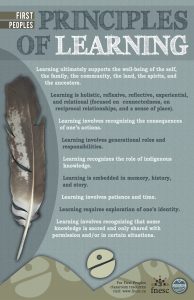
Fnesc. “First Peoples Principles of Learning.”www.fnesc.ca.
Group Members
Time to meet the group and learn a little bit about each one of us!
Chase Thomson
Hi, I’m Chase. I am a fourth year Arts student majoring in English Literature with a minor in Creative Writing. I’m absolutely thrilled with the topic that my peers and I have settled on. One of the big takeaways of this course so far for me has been how unfamiliar I was with First Nations struggles and First Nations literature/culture. Because of this, I am personally interested in exploring different ways that Indigenous cultures (literature and oral storytelling) and struggles (residential schools and colonization) can be integrated into a high school classroom. These topics were something that were very lightly touched upon in my high school education and I firmly believe there needs to be a change within the curriculum to ensure that students are learning about the culture of the people whose land they occupy. Specifically, I’d like to explore how we can divert the current fact-based curriculum to a more literary and culturally enriched curriculum. In addition, I want to find a way to ensure that we are true to the Indigenous ways of teaching, learning, and storytelling. I’m excited to work with my group mates, as I feel we share similar passions when it comes to this project, as well as another group with which we can share our ideas!
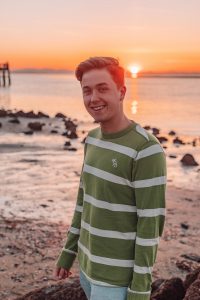
Grace Owens
Hi, I’m Grace. I am a third year Arts student, majoring in English literature and minoring in theatre studies. I am excited to open up this dialogue regarding First Nations curriculum in BC high schools, as I am passionate about education. I am hoping to get into the UBC Bachelor of Education and pursue a high school teaching career in both theatre and English, so this is a very relevant interventional discussion for my future of teaching. Throughout this collaboration project I hope to open up dialogues around the actual effect that first hand learning has on high school students and whether a more literature-based personal approach creates a better understanding of Canada’s First Peoples than the current history, fact based one does. My interests lie in the learning effects that a more story based curriculum would have on teenager’s learning and whether it would create a more empathetic tie to First Nations culture rather than a strictly knowledge based account of events. I have found the stories and first accounts in this course very interesting and engaging and hope to expand on my passion for the way in which we learn and the effect it has on us as individuals throughout this project. I look forward to connecting with not only my group mates but also the greater class around this topic to continue learning from one another!
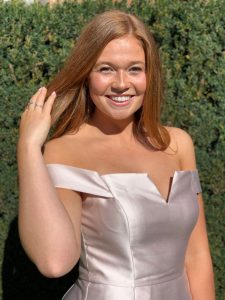
Jade Greer
Hi everyone, I’m Jade. I’m majoring in English Literature and minoring in Gender, Race, Sexuality, Social Justice. I’ll be graduating in May and am hoping to pursue a career either in student development or human resources. Since beginning my studies at UBC, I have learned literary theories that teach me how to unlearn and reinterpret what I was taught by national discourse and from popular media. Some of my favourite literary theories are queer theory and postcolonial theory. Learning about these theories has given me the tools to analyze the content around me, read between the lines, and most importantly to look beyond the text itself.
I am from the United States so I am not familiar with Canadian high school curriculums, however, after speaking with my group I realized we had similar experiences. In my third-year of high school, each student was in a year-long two period course called “American Studies”. The purpose of this course was to teach us the history and literature that defines our nation and to go more in depth to the darker side of history to have a more accurate understanding of how America was built. This included Japanese internment in World War II, slavery, and a brief overview of colonization. As important as it was for high school students to know what really happened, we were nonetheless left with a viewpoint that pathologized Indigenous communities. For our research project, I’m interested in exploring ways to incorporate Indigenous history and literature into the B.C. high school curriculum that goes beyond the basic definition of colonialism and is nuanced and plural. I can’t wait to begin this conversation with you all!
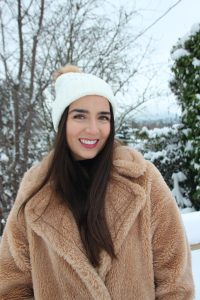
Sidney Scharf
Hello, I am Sidney. I am a fourth year Arts student majoring in Asian studies and minoring in TESL (Teaching English as a Second language). I am graduating soon and when I graduate I plan to teach English at a language school in Vancouver. The reason why I took this class is because in the future I will be working with international students, immigrants, and people with refugee status and I feel like part of my job will be to teach my students about Canada’s Indigenous people. I am really excited to collaborate with the members of my group and with other groups in order to come up with some ideas on how we can improve and expand Indigenous education in BC secondary schools. For this conference I am personally interested in how we can integrate Indigenous ways of learning and understanding into the classroom. I am interested in Indigenous ways of learning because I believe that even still to this day there are pedagogies being used inside BC schools that are aligned with colonialism. And I feel that in order to teach Indigenous literature properly the first step is to decolonize education and learn how to teach Indigenous literature in a way that reflects Indigenous ways of teaching and learning. Overall from this conference I hope to learn about different methods to teach Indigenous literature and then try to implement what I have learned into my future job as an English teacher.
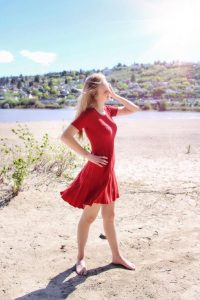
Video
Nella Nelson, the District Coordinator of the Aboriginal Nations Education Division at the University of Victoria, shares different ways Indigenous literature can be incorporated into education. She discusses how literacy exists in multiple ways, for example orally, through art, through stories, and through the land. This video is of interest to us because it provides great examples of methods to incorporate Indigenous studies that go beyond facts and explore various cultures and practices.
